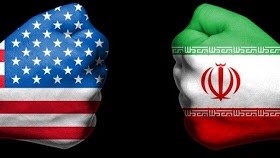The whole world is living in an almost daily state of anticipation for the development of the events of the declared conflict between America and Iran and its repercussions on Iraq in particular and the Arab region in general, where most Iraqis and Arabs are divided into two trenches on both the official and popular levels, one of which is supportive of Iran, the Muslim neighbor. The other is a supporter of America, the strong savior from the Iranian expansion that swallowed Iraq, Syria and Lebanon, and on this basis the map of the Arab region was redrawn to tear up the Gulf alliance – which had been sober for many years – so that Qatar and Oman would be within the Iranian camp, where Saudi Arabia, the UAE and Bahrain are in the hostile camp against Tehran and every country maintains a good relationship with Iran, as for Kuwait, its position appears to be conciliatory and appears to follow the events, while all these countries agree on an excellent relationship with America, and what raises the question is that Saudi Arabia and the UAE It has not severed its relations with the successive Iraqi governments that have declared loyalty to Iran and directly implement its interests in the region!. Returning to the relationship between Tehran and Washington, we find that it was characterized by a state of declared hostility between the two countries that did not subside except during the reign of the son of the Shah, Muhammad Reza Pahlavi, who moved the graphical curve of relations between the two countries from the decline to the peak of prosperity, this has formed a relationship of friendship with America, the observers may even calculate it as an absolute dependency relationship in exchange for stabilizing his rule over the country, in contrast to the approach taken by his father, Shah Reza Pahlavi, who chose to support the Nazi camp against America and the Allied countries during World War II.
As for the modern decade, the relationship between Iran after the Islamic revolution and America experienced a major setback, which reached a complete break in the diplomatic relations between the two countries in 1980, that includes accusations exchange and threats of military war intervention, During these threats, the economy of the largest Gulf states drained out, and no observer of the situation missed noticing that Iraq pays the bulk of the bill for this conflict from its economy and wealth, and even from the security and safety of its citizens.
On the opposite side, the observer of events sees that both countries are running in parallel lines, they rarely clash in a way that affects their real interests in the region, at the time when Iran considers America the greatest Satan that destroys and dominates peoples, and despite its explicit condemnation of the US military operations in Afghanistan, Iran provided military and logistical support to the US forces after October in 2001, based on an agreement between the two countries in which Tehran allowed its ports to be used by America, and the support continued until it reached to provide military support to the US forces there.
The same thing was repeated after the US invasion of Iraq, where America led Iraq to the opposition that owes absolute loyalty to Iran, which contributed to the Iranian expansion in Iraq. The list of the declared axes of the conflict between the two countries goes on and on. Perhaps the most prominent and controversial one is the Iranian nuclear file, which took years of ebb and flow, and cost Iran a lot of sanctions and economic losses, but the same question mark is expanding and growing.
Why is America reluctant to prevent Iran from proceeding to move forward with its nuclear program by various means, and one of them may be the military option, as it happened in 1981 when Israeli planes attacked the first nuclear reactor in the region where it was still under construction in Iraq, although the strike was not preceded by sanctions or warnings for years, as happened with Tehran.
And here is the question returns to the fore about the controversial nature of relations between America and Iran, is it hostility or convergence and disagreement with the desire of the two parties of the conflict for the survival of each other, because its presence as a destructive force considered to be as a scarecrow for the rest of the countries in the region that have neglected politics and settled for a policy of loyalty to maintain security that is on a hot spot …

